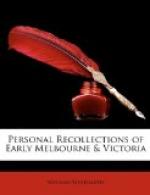One of the pleasant incidents to vary our social life was the arrival in 1850 of the young Prince of Schleswig-Holstein, to whom there occurred, during the German dynastic confusion that followed the revolutionary year 1848, an opportunity to see the world. Accompanied by his guardian, Captain Stanley Carr, he arrived by one of the Messrs. Godeffroy’s ships from Hamburg, having been swayed to some extent in selection of travel route by the fact of German emigration to Port Phillip having commenced the year before through the same firm. The Prince, who was then only of the age of nineteen, and of most amiable and ingenuous look, had that charm of the true politeness of his years, which left you the impression that he thought that everyone was to be preferred to himself. If unfortunate, in the chances of the struggle, in being dropped out of his principality, he was afterwards compensated in another direction, for not only is his younger brother our Queen’s son-in-law, but one of his daughters is to-day Empress of Germany. What a reminder are such changes of the swift passing of time and of the crowd of portentous events in these quick-speeding years.
The Prince and his guardian landed, as it were, in my arms, by virtue both of introductions from the Godeffroys, and of my position as virtual parental head of the German flock which had begun to stream into Port Phillip. Unacquainted myself with the language, I was ably and untiringly helped, as I have said, by my late friend Mr. Neuhauss. The Prince took the thin disguise of Lieutenant Groenwald, but I never heard that name, except in Captain Carr’s official intimation. We all called him the Prince, but he was equally courteous and unassuming whatever way we addressed him. It was quite touching to see the harmony that existed between ward and guardian, the one looking up to his sage Mentor with the trustful tractability of a child, the other reciprocating high regard out of the depths of that ultra-Tory sentiment with which long residence within German Court vicinities, and perhaps a natural turn of mind, had imbued him. We have been apprised of this still lingering German high sentiment by hearing at times of the late Emperor Frederick’s habit, when Crown Prince, of calling the Princess “wife,” and of asking, when looking for her, where his “wife” was—a transgression of court etiquette so appalling as well nigh to send the queried parties off into a fit. There was another amusing illustration from Captain Carr. He came to me once very considerably disconcerted by the report of a public meeting the day before, at which he, oblivious for the moment of the inevitable omnipresent English free press, had offered some remarks. The “Argus”, under the undiscriminating democratic pen of Kerr, its editor, had reported that “Captain Stanley Carr had told the meeting that the King of Prussia had told him” so and so; whereas, as Carr sorrowfully complained, the proper expression should have been that “an exalted personage in Prussia had led him to understand” so and so. But, added my friend, with manifest comfort, the departure from propriety was so flagrant that, if the report did happen to reach the king’s eyes, he would never believe it of him.




